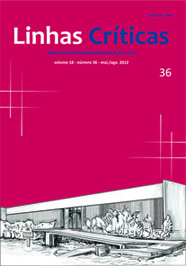Is Ethics Education a form of violence against the student?
DOI:
https://doi.org/10.26512/lc.v18i36.3923Keywords:
Ethics Education, Education in Kant, Education in Durkheim, Education in Adorno, Tension between the individual and societyAbstract
Chauí, in her book Convite à Filosofia (2006, p. 310) asks a compelling ethical question to educators: would ethics education be a form of violence against human beings? First, because it seeks to transform us from passive beings into active beings; if our nature is passionate, driven by our instincts, wouldn’t forcing rationality upon us be an act of violence against spontaneous nature? If ethics education aims to connect us with the values of society, wouldn’t it be a submission to an external power, and in this case, instead of autonomous individuals, wouldn’t we be the slaves of norms and values imposed by society? Based on the contributions of Kant, Durkheim and Adorno, this paper aims at analyzing the questions asked by Chauí, and making contributions to the ethics education of our students and educators.
Downloads
References
ADORNO, Theodor Wiesengrund. Minima Moralia: reflexões a partir da vida danificada.Tradução de Luiz Eduardo Bicca. São Paulo: Ática,1992.
______. Educação após Auschwitz. In: COHN, Gabriel. Theodor W. Adorno. Tradução de Aldo Onesti. São Paulo: Ática, 1986, p. 33-45.
______. Indústria Cultural. Tradução de Amélia Cohn. In: COHN, Gabriel. Theodor W. Adorno. Sociologia. São Paulo: Ática, 1986, p. 92-99.
______. Aldous Huxley e a utopia. In: ADORNO, Theodor Wiesengrund. Prismas: crítica cultural e sociedade. Tradução de Augustin Wernet e Jorge de Almeida. São Paulo: Ática, 1998, p. 91-116.
______. Educação ”“ para quê? In: ADORNO, Theodor Wiesengrund. Educação e Emancipação.Tradução e Introdução de Wolfgang Leo Maar. 3. ed., São Paulo: Paz e Terra, 2003.
______. Tesis sobre La necessidad. In: ADORNO, Theodor Wiesengrund. Escritos sociológicos I. Obra Completa, 8. Madrid: Ediciones Akal, 2004, p. 365-368.
______. Minima Moralia: reflexões a partir da vida lesada. Tradução de Gabriel Cohn. Rio de Janeiro: Beco do Azougue, 2008.
CHAUÃ, Marilena. Convite à Filosofia. 13. ed. São Paulo: Ática, 2006.
DURKHEIM, Emile. Educação esociologia. Tradução de Lourenço Filho. 4. ed. SãoPaulo: Edições Melhoramentos, 1955.
KANT, Immanuel. Resposta à pergunta: que é o esclarecimento? In: KANT, Immanuel. Textos Seletos (edição bilíngue). Petrópolis: Vozes, 1985.
______. Crítica da Razão Prática. Tradução de Artur Morão. Lisboa: Edições 70, 1994.
______. Sobre a Pedagogia. Tradução de Francisco Cock Fontanella. Piracicaba: Editora UNIMEP, 1996.
PASCAL, Georges. O Pensamento de Kant. Tradução de Raimundo Vier. 3. ed., Petrópolis: Vozes, 1990.
Downloads
Published
How to Cite
Issue
Section
License
Copyright (c) 2016 Linhas Críticas

This work is licensed under a Creative Commons Attribution 4.0 International License.
Authors who publish in this journal agree to the following terms:
-Authors maintains the copyright and grants the journal the right of first publication, the work being simultaneously licensed under the Creative Commons Attribution License which allows the sharing of the work with recognition of the authorship of the work and initial publication in this journal.
- Authors are authorized to enter into additional contracts separately, for non-exclusive distribution of the version of the work published in this journal (eg publish in institutional repository or as a book chapter), with acknowledgment of authorship and initial publication in this journal.
-Authorers are allowed and encouraged to publish and distribute their work online (eg in institutional repositories or on their personal page) at any point before or during the editorial process, as this can generate productive changes as well as increase the impact and the citation of published work (See The Effect of Free Access).



